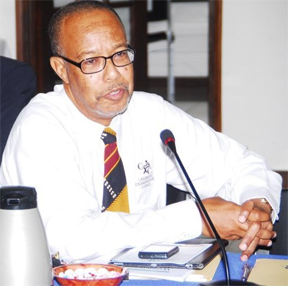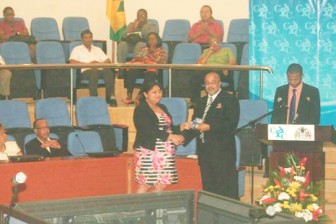There has been a significant decline in the performance of CSEC students around the region this year in English A, with 47% achieving grades 1-3, while only a few candidates were able to score full marks on each Math paper.
This was disclosed yesterday at the Guyana International Conference Centre at Liliendaal, East Coast Demerara, when representatives of the Caribbean Examinations Council visited to officially release the region-wide results which has been done for the first time in Guyana.

Presenting the results was Dr. Gordon Harewood, Senior Assistant Registrar, Examinations Development and Production Division, who said that summary writing in English remains a challenge while performance on the Understanding profile proved to be significantly better than on expression.
In the area of Mathematics, he said that some of the content that should have been mastered at the lower secondary level is still challenging students at CSEC level. He recommended that students preparing to sit Pure Math at CAPE first complete the Caribbean Certificate of Secondary Level Competence (CCSLC) which he said would provide a solid foundation to address observed weaknesses in both English A and Math.
“CCSLC spent a lot of time trying to ensure that students master those fundamental competencies and skills that they should acquire in order to go on to higher classes at the secondary level,” Harewood explained.
Additional Math, he continued, started this year with very small entries but very commendable performances. It was noted that 58% of candidates secured grades 1-3.
“We are really encouraging all of our candidates who intend to go on to do Pure Math at CAPE to take up Additional Math. There have been complaints that students who write Pure Math do so with some gaps that still need to be remedied so this syllabus was constructed specifically with that in mind and it does provide a great platform for success at Pure Math,” Harewood explained.
There was a decline of 3% in the percentage of candidates who scored grades 1-3 at the English B exams with the most evident decline on the Poetry profile.
As it relates to Information Technology, there was an improved performance as compared to 2010 with over 80% acquiring grades 1-3. However, it was noted that a number of candidates demonstrated poor examination strategies such as rewriting the question which is considered irrelevant.
At CSEC Physics, there were topics that related to modern physics and it was found that while some candidates performed exceptionally well, many did very poorly.
“The topics are not so well covered in the text books so they have to do reading outside of the text books. There was an improvement in performance regionally and this involves Guyana,” Harewood noted.

With regards to CSEC Caribbean History, he said that there were challenges in the requirement of extended essays, which saw forms of plagiarism. Teachers were urged to monitor and reject plagiarism to avoid it reaching the level of CXC.
In the Agricultural Science exam, there was an 80% achievement of grades 1-3 regionally. In Technical Drawing, he continued, performance was good although it declined in comparison to previous years.
Basic areas that would require attention, he said, with simple parts like presentation, line work, labelling diagrams, etc, were ignored.
It was noted also that the highest number of CSEC subjects written by a candidate was 17 and candidates who wrote this year’s exam ranged from 12 to 72 years old.
12-year-olds
Highlighted was the achievement of two 12-year-olds who secured grade 1 in Mathematics and another 12-year-old who scored a grade 1 in Agricultural Science.
There was much improvement at CAPE this year, with better performances at Communication Studies and Pure Math.
He added that Pure Math has seemingly been challenging over the years and performance is still not at the level that the body would like to see it.
Meanwhile Unit 1 Biology has also seen a distinct improvement in performance at CAPE while Unit 2 is “as solid as a rock, stable.” ]
CAPE Law too has been a challenge across the region since qualified persons to teach this subject are lacking, Harewood stated. Also, in Management of Business, there has been an improvement in performance on Unit 1 and a steady performance in Unit 2.
And in Sociology, there has been a slight decline in the performance at Unit 2 with an increased number of candidates.
He also touched briefly on results of the CCSLC exam, noting that there has been 85.8% acceptable grades in English, 73.7% in Mathematics, 81.5% in Social Studies, 84.3% in Integrated Science, 73.0% in French and 68.4% in Spanish.
Addressing the forum also was CXC Registrar, Dr. Didacus Jules, who emphasized that in order for there to be steady improvement, there must be less lamentation and more decisive action.
It was noted that an entire system reform is needed which is aligned to the challenges as well as the opportunities in a very dynamic global environment.
Academically minded
Dr. Jules stated that one of the most pernicious concepts that unfortunately exist among educators is the notion that they have students who they call “not academically minded.”
“There is no such thing in education. Every student is capable of learning. It is we who are not capable of teaching. So the problem is not the student… the problem is the approaches that would make it possible for the student to learn… it is one simple objective that we must set in this region; make learning fun. If we make learning fun, all these problems we face will disappear,” he opined.
The CXC Registrar also pointed out that there are broader issues that must not be forgotten and which are putting the education system under great pressure.
“I see more and more our teachers under pressure because parents are not playing their role… we all have our role to play in this enterprise. What we must recognize is that education is under great strain and it does not need people to stand on the outside, we need people who are prepared to put their shoulder behind the wheels… whether you are a parent, an employer, whatever you are, a clergy person, you have a role to play. We need to take some of the strain off of the teachers. Teachers are not responsible for teaching good manners in school.
A parent is supposed to do that and teachers should reinforce it,” Jules explained.
Education Minister Priya Manickchand in her address said that Guyana is celebrating the fact that we have moved away from a period when all the top students matriculated from Queen’s College.
“We are now able to celebrate all of Guyana when we celebrate our top students,” she said, making reference to Guyana’s top CSEC student, Sarah Hack of Abram’s Zuil Secondary on the Essequibo Coast.
“I am not a pessimist but I do wish to confront the dismal results we have seen… I think we need to be somewhere close to despair when we look at the results in the core areas which tells us that our children are going to have a lot of doors closed to them,” Manickchand said.
She too agreed that there is a need to stop lamenting and instead to start tangibly doing something about improving the performances.
“We must firstly accept and pronounce the horror that has been our English and Mathematics grades for almost all of our history… All our citizens must understand this to be a problem and all must be consciously engaged in the solution,” she noted.
Manickchand urged education ministers and education officers in the region to never be hesitant to disclose the reality of the sector.
“Those realities should not be discredited simply because they fear criticism in the hands of the opposition parties in their respective countries; a weapon with which the government of the day could be beaten. The education of our boys and girls should never be politicized,” she posited.





